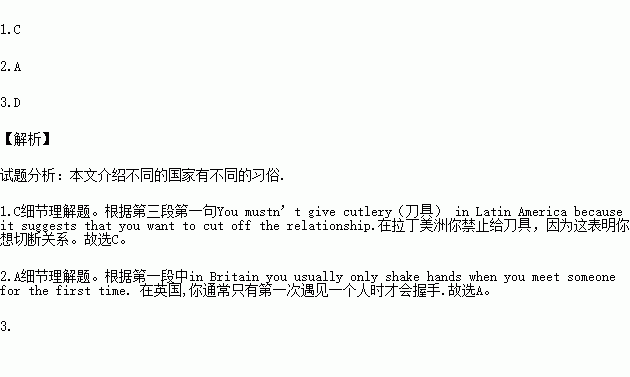题目内容
You have to shake hands when you’re coming or going in Germany, but in Britain you usually only shake hands when you meet someone for the first time.
You have to give your present in public in the Middle East to show it’s not a bribe(贿赂), but it’s good manners to give your present in private in Asia.
You mustn’t give cutlery(刀具) in Latin America because it suggests that you want to cut off the relationship. You mustn’t give a clock in China because the Chinese word for clock is similar to the word for funeral(葬礼).
“Come any time” means “I want you to visit me” in India. If you don’t suggest a time and arrange a visit immediately, an Indian will think you are refusing the invitation.
Offices are usually closed on Friday in Moslem countries.
It’s bad manners to discuss business at social occasion in India.
In an English pub, you have to take your turn to buy a “round” drink for everyone in your group.
1.From the passage, in Latin America, _____.
A. you must shake hands when you meet a person for the first time
B. you have to give your present in private
C. if you want to cut off the relationship with somebody, you can give him cutlery
D. you can’t give a clock to your friend as a present
2.Which one is wrong in the following sentences?
A. You can’t shake hands when you meet someone for the first time in Britain.
B. You can give present in private in Asia.
C. When an India says “come any time”, you should suggest a time if you want to visit him.
D. Some people in Moslem countries don’t need to work on Friday .
3.In India, it is good manners to _____.
A. give present in public to show it’s not a bribe
B. discuss business at a social occasion
C. take your turn to buy drink for everyone in your group in a pub
D. arrange a visit at once when an Indian says “come any time” to you

